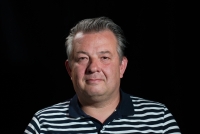The smell of Grandpa’s workshop cannot be forgotten
Download image
David Pötzl was born in Karlovy Vary on 14 June 1975. His father Jan Pötzl, a master violin maker, continued the family tradition of making stringed instruments. His mother Marie was born in Český Krumlov, graduated from Charles University and founded pedagogical-psychological counselling in the former Czechoslovakia. During the Velvet Revolution, his father was on secondment in Hamburg and the whole family was with him. David Pötzl later graduated from high school, but he was still attracted to violin making. After graduation, he enrolled at the violin school in Luby instead of going to university. He returned to Hamburg to practice. As of 2024 he was specialising in repairing historical stringed instruments and living in Karlovy Vary.







